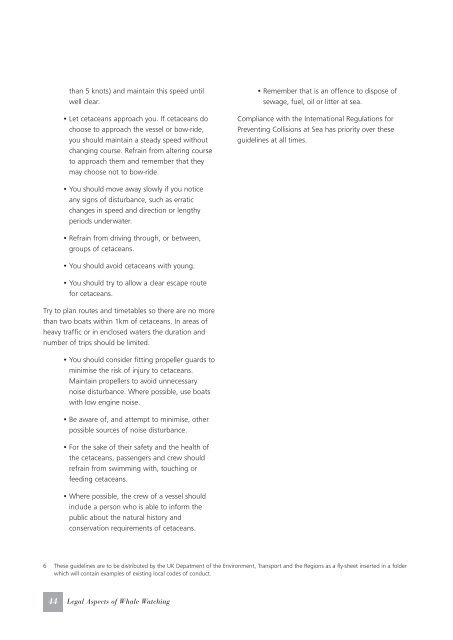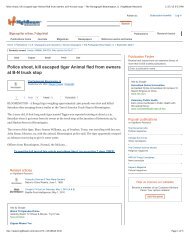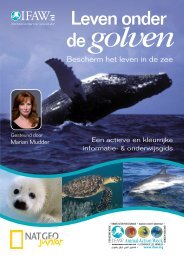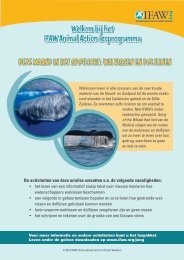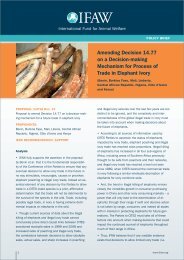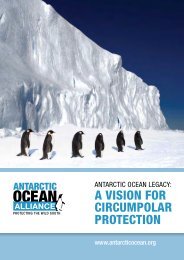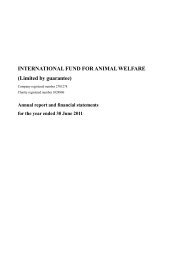leagal aspects of the whale watching.pdf - International Fund for ...
leagal aspects of the whale watching.pdf - International Fund for ...
leagal aspects of the whale watching.pdf - International Fund for ...
You also want an ePaper? Increase the reach of your titles
YUMPU automatically turns print PDFs into web optimized ePapers that Google loves.
than 5 knots) and maintain this speed until<br />
well clear.<br />
• Let cetaceans approach you. If cetaceans do<br />
choose to approach <strong>the</strong> vessel or bow-ride,<br />
you should maintain a steady speed without<br />
changing course. Refrain from altering course<br />
to approach <strong>the</strong>m and remember that <strong>the</strong>y<br />
may choose not to bow-ride.<br />
• You should move away slowly if you notice<br />
any signs <strong>of</strong> disturbance, such as erratic<br />
changes in speed and direction or lengthy<br />
periods underwater.<br />
• Refrain from driving through, or between,<br />
groups <strong>of</strong> cetaceans.<br />
• You should avoid cetaceans with young.<br />
• You should try to allow a clear escape route<br />
<strong>for</strong> cetaceans.<br />
Try to plan routes and timetables so <strong>the</strong>re are no more<br />
than two boats within 1km <strong>of</strong> cetaceans. In areas <strong>of</strong><br />
heavy traffic or in enclosed waters <strong>the</strong> duration and<br />
number <strong>of</strong> trips should be limited.<br />
• You should consider fitting propeller guards to<br />
minimise <strong>the</strong> risk <strong>of</strong> injury to cetaceans.<br />
Maintain propellers to avoid unnecessary<br />
noise disturbance. Where possible, use boats<br />
with low engine noise.<br />
• Be aware <strong>of</strong>, and attempt to minimise, o<strong>the</strong>r<br />
possible sources <strong>of</strong> noise disturbance.<br />
• For <strong>the</strong> sake <strong>of</strong> <strong>the</strong>ir safety and <strong>the</strong> health <strong>of</strong><br />
<strong>the</strong> cetaceans, passengers and crew should<br />
refrain from swimming with, touching or<br />
feeding cetaceans.<br />
• Where possible, <strong>the</strong> crew <strong>of</strong> a vessel should<br />
include a person who is able to in<strong>for</strong>m <strong>the</strong><br />
public about <strong>the</strong> natural history and<br />
conservation requirements <strong>of</strong> cetaceans.<br />
44 Legal Aspects <strong>of</strong> Whale Watching<br />
• Remember that is an <strong>of</strong>fence to dispose <strong>of</strong><br />
sewage, fuel, oil or litter at sea.<br />
Compliance with <strong>the</strong> <strong>International</strong> Regulations <strong>for</strong><br />
Preventing Collisions at Sea has priority over <strong>the</strong>se<br />
guidelines at all times.<br />
6 These guidelines are to be distributed by <strong>the</strong> UK Depatment <strong>of</strong> <strong>the</strong> Environment, Transport and <strong>the</strong> Regions as a fly-sheet inserted in a folder<br />
which will contain examples <strong>of</strong> existing local codes <strong>of</strong> conduct.


